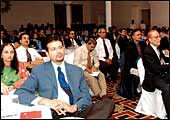 |
| Discussing wealth: (L to R) SEBI's
G.N. Bajpai, TCS' S. Mahalingam, Birla's Santrupt Misra, Godrej's
Adi Godrej, Birla's Sumant Sinha, Stern Stewart's Tejpavan Gandhok,
GAIL's Proshanto Banerjee, Wockhardt's Habil Khorakiwala and
ICICI Bank's Nachiket Mor |
Just
what is wealth creation all about? it was a question on everybody's
mind gathered at the Taj, Mumbai for the second Business Today Corporate
Governance Summit, presented by BPL Mobile. The evening also saw
the release of the issue of the magazine featuring the fifth BT-Stern
Stewart ranking of companies that create wealth. The difference
this year was that the methodology had been tweaked to represent
not market valued added (MVA), but Wealth Added-which measures wealth
flow in excess of the investors' expected return. As a result, sectors
such as pharma, FMCGs and it had lost out on the latest chart, said
Stern Stewart's Tejpavan Gandhok; their investor expectations had
overshot performance. The real heroes, instead, were the "unsung
heroes"-the oil and gas majors.
The chief guest, G.N. Bajpai, Chairman, SEBI,
noted that investors actually care little about people in companies-they
want stock appreciation. "The relationship of investors with
a company is purely economic," he observed, but saw wisdom
in wealth distribution being extended to all stakeholders, not just
shareholders. "A concept of sharing the wealth must be developed,"
he urged.
That was followed by a panel discussion on
meeting the expectations of both investors and employees. "I
think being able to align employee interest with shareholder interest
is the best way of going about creating wealth," said Adi Godrej
of the Godrej group, detailing his group's variable remuneration
system. Stock options, however, were not a tool favoured by all.
"To me," said Santrupt Misra of the AV Birla Group, "reward
is a perceptual and psychological concept, not an economic concept."
 |
| Presenting the wealth index: BT's
Ashish Bagga (left) with SEBI's G.N. Bajpai releasing the Business
Today special issue on India's Biggest Wealth Creators |
Nachiket Mor of ICICI Bank explained how his
bank had succeeded by focusing on employees-and leveraging technology
for strategy execution, especially to meet the challenges of diversification.
"While we can see a lot of speed in the market and a great
deal of aggression," he said, "what has gone behind it
is a fair bit of planning."
Habil Khorakiwala of Wockhardt dwelt on how
his pharma company had boosted motivation and competence levels
to turn R&D and exports into twin strengths for a global competitive
advantage. "Another major point is to align our organisations
with what is to India's advantage," he said, adding that well-managed
human resources could work wonders on that score.
Proshanto Banerjee of GAIL touched upon the
company's growth strategy under the constraints of regulation. Benchmarking
with the world' best was one aspect, and driving market growth (rather
than being driven by it) was another, even as professionalisation
of the staff continued apace. "The market has responded extremely
well to this," he said.
Sumant Sinha, also of the AV Birla group, gave
the audience an overview of his group's response to economic changes,
before saying that market cap depended largely on discounted future
cash flows, and so managing expectations of Future Growth Value
(FGV) was key. "I think it is very important to manage the
communication aspect well-over and above the actual creation of
value in the company."
 |
| Wealth watchers: A matter of their
expectations |
But how best does a company stay ahead of expectations?
The pharma case came into specific focus, with expectations of the
sector reigning so high-given India's unique thrust in global generics.
There were risks, of course, but were they being communicated to
investors effectively? Bajpai advised companies to tell investors
of the limits to wealth creation potential-especially with economic
ages shortening all the time.
What about the IT sector: could it hope to
keep matching expectations? S. Mahalingam of TCS responded with
surprise that anyone doubted the sector's growth sustainability.
The sector had its future well figured out, he said. And FMCGs?
"I think there has been very little radical innovation in the
industry," complained Godrej, asking his sector for some fresh
big ideas.
|
